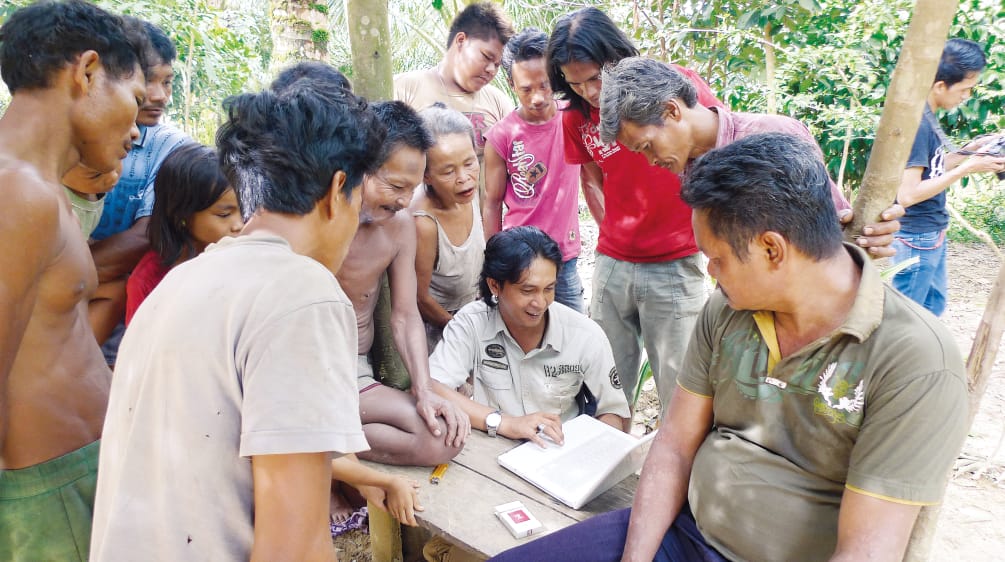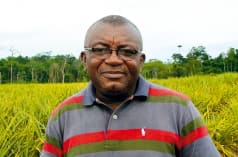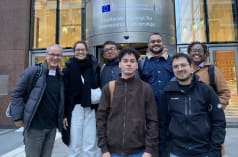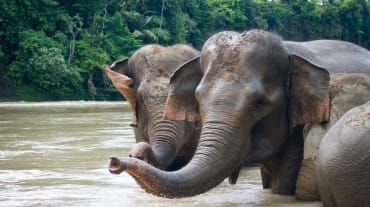Coal road to slash through Sumatra’s protected Hutan Harapan forest
 Activist Feri Irawan and indigenous Suku Anak Dalam people (© Birgit Handke)
Activist Feri Irawan and indigenous Suku Anak Dalam people (© Birgit Handke)
Aug 30, 2020
The Indonesian government has authorized a road to be cut through the protected ‘Forest of Hope’, Hutan Harapan. Transporting coal thus clearly takes priority over the climate. The road will fragment the habitat of tigers and elephants, endanger the livelihoods of local people and defeat the purpose of an internationally funded climate project.
“The ‘Forest of Hope’ is one of the last lowland rainforests in Sumatra, and this road will be the gateway to its final destruction. Our ‘hope’ is just about gone.” The angry words of Feri Irawan, an activist for our Indonesian partner Perkumpulan Hijau (Green Association) were prompted by the Indonesian government’s authorization of a road to be cut through the protected Hutan Harapan protection forest in Sumatra – a habitat for tigers and elephants.
The road that prompted Feri’s frustration will slash through the heart of the Hutan Harapan, or ‘Forest of Hope’ – a climate project funded with international development aid. Hutan Harapan is located in the traditional settlement area of the Suku Anak Dalam (Children of the Interior), an indigenous people whose interests the Green Association has been advocating for decades. It was only two years ago that Feri Irawan was able to establish land rights for a number of groups in Sepintun, north of Hutan Harapan. We reported on how this saved the Sepintun elephant forest.
Hutan Harapan is a project designed to reduce deforestation and greenhouse gas emissions – an important component in the Indonesian climate program. Several Indonesian and international organizations, including the Indonesian Forest Ecosystem Conservation Foundation (Yayasan KEHI), Germany’s Naturschutzbund Deutschland e.V. (NABU) and the Royal Society for the Protection of Birds (RSPB) are managing its implementation on an area of 100,000 hectares during a seven-year period (2019-2026).
The project is being financed by the German government’s International Climate Initiative (IKI) and the funds disbursed by Kreditanstalt für Wiederaufbau (KfW), a development bank. As Germany has a major stake in the success of the project, the German Environment Minister Svenja Schulze expressed her concerns to her Indonesian colleague Siti Nurbaya Bakar, but to little avail: a number of conditions were apparently imposed on the company behind the road project, and the least harmful of three route options was chosen. But the route nevertheless fragments the forest and thus the wildlife habitats and casts uncertainty over the future of the Hutan Harapan climate project.
According to Indonesian environmental activists, the road will serve a company that intends to operate a coal mine outside of Hutan Harapan. The clear winners of the road project are business interests and the coal industry in particular, while the forest, the Suku Anak Dalam people, the elephants and many other animals and plants will lose out.
“Nature and the people of Sumatra are falling by the wayside in Indonesia’s economic policy,” says Feri Irawan. “If we lose hope for Hutan Harapan, people will become even more impoverished. Our province Jambi is blanketed in monocrops. The farmers no longer grow vegetables now that they have become dependent on palm oil. Now their income has dried up due to the pandemic. The forest and fields that used to provide their livelihoods are gone,” explained the activist.
“Our president finally needs to choose: Does he stand for business interests that run roughshod over people and nature, or for protecting indigenous people, the rainforest and the climate? Indonesia is a signatory of the Paris Agreement and has stated that it would curb emissions from deforestation. Indonesia has promised indigenous people more protection. But now the government is breaking all of its pledges.”












